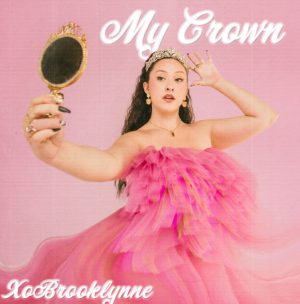In Defense of XoBrooklynne
February 9, 2022
Although social media can be a powerful tool for connection and enjoyment, having a public role online can often lead to harsh criticism from large groups of people. For female public figures specifically, nearly every action finds criticism, and content creator XoBrooklynne was no exception. However, she faced the critiques head on, fooling the entire internet in the process.

Her master plan began on November 27, 2021, when she posted a video singing “All Too Well” by Taylor Swift with the caption, “I’ve been working so hard on my music & it’s almost time I can finally share it with all of you <3.” Even though Brooklynne was only 17 years old (and her only crime was posting a video having fun on TikTok), the hate comments immediately started rolling in. Comments like, “u should be on Americans got talent 🎤🎼✨but stay in the audience🧚♀️💗✨,” “Taylor swift just got back with jake after seeing this,” and “COnfIdenCE iS kEY🧚♂️🧚♀️💚but your locked out✨🧚♂️🧚♀️,” crowded the comment section.
However, despite so many people expressing such hatred for her voice, the video still received around 618.2 thousand likes and over 43,000 comments. Additionally, various other creators on TikTok dueted or stitched Brooklynne’s video. Most complained about her singing or made similar comments to those under her video, but some defended her. @faythegay posted a video calling for the bullying to stop with the caption, “I’m sick of seeing duets and stitches inviting bullying of ppl expressing themselves. This isn’t ok.” However, the hatred gained much more traction than the videos defending Brooklynne.
Two days after the initial video, Brooklynne posted another TikTok announcing the upcoming release of her first single. Once again, hate comments packed her comment section: “it’s the way she though she ate w ‘i love a good scandal,’” “my 13th reason,” and “done. you’re done.” Nevertheless, Brooklynne released her single along with a professionally filmed music video, persisting with her music career despite the hatred. The video received upwards of 2.8 million views along with 46,000 likes, and Brooklynne’s VEVO account gained 12,100 followers. Then, a little over a week later, Brooklynne posted a video announcing the release of her entire debut album, “My Crown: The Album.” However, when people went to listen to it, they discovered that the entire album included remixes of her song “My Crown,” including “I Wanna Be On Broadway,” a version of “My Crown” sung by an impersonator of Alexander Hamilton. By then, people began to realize that something was off. TikTok users had been relentlessly bullying Brooklynne thinking she genuinely wanted to start a music career, but had they been played the entire time? Immediately, the attitude towards Brooklynne completely flipped. Comments on her album announcement video included, “SHE’S PLAYING ALL OF YOU I CAN’T,” “girl i’m gonna admit this was too funny LMFAOAO,” and “YOU ARE A COMEDY GENIUS.” The same people that verbally attacked her were now showering her with praise, and they continued to do so when she posted a video declaring that the whole thing had been a joke.

Although the reveal of Brooklynne’s scam was funny, what if she hadn’t been joking? What if she had really just been a 17-year-old girl trying to express herself? Even though some people knew she was joking from the start, others didn’t and still relentlessly bullied her on TikTok. If she had seriously been trying to learn music and suffered criticism from every corner of the internet, that could have had serious consequences for her mental health and self-esteem. Instead, she took advantage of the internet’s tendency to spread hate and used it to gain popularity, successfully gaming the system. However, we truly can never know whether something on the internet is a joke or not, and in order to prevent serious cyber-bullying, we need to stop letting hate spread faster than positivity. If people did not gain likes, views and comments from harsh criticism, they wouldn’t post it.
Additionally, people often justify their own cyber-bullying by saying, “What difference is one person going to make?” Yet when half of the people on the internet say the same thing to themselves, hate will spread like wildfire. While definitely hilarious, Brooklynne’s scam also unearths the internet’s toxicity and teaches content consumers a lesson on what should and should not be spread online.

